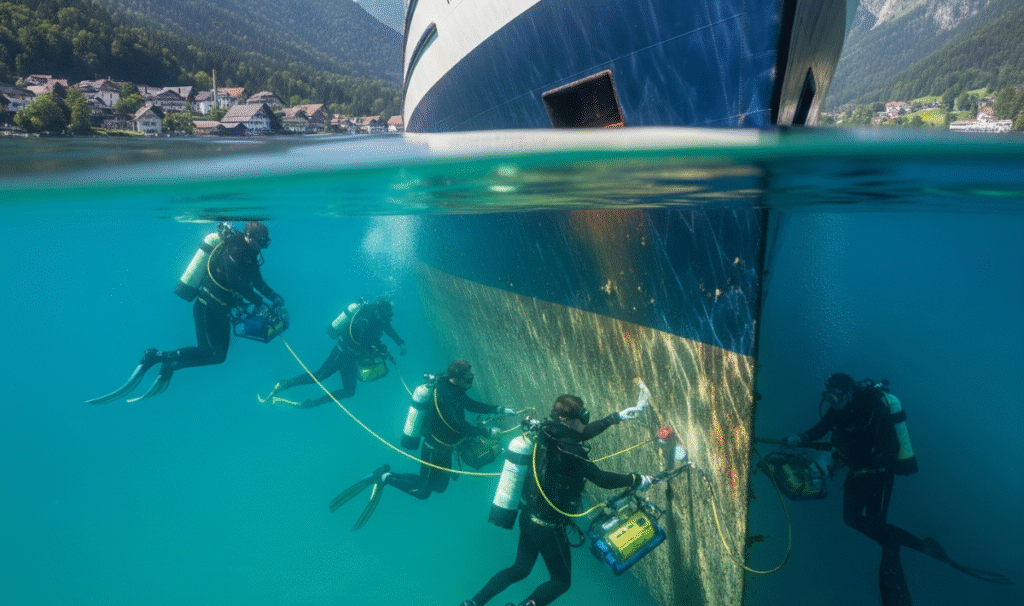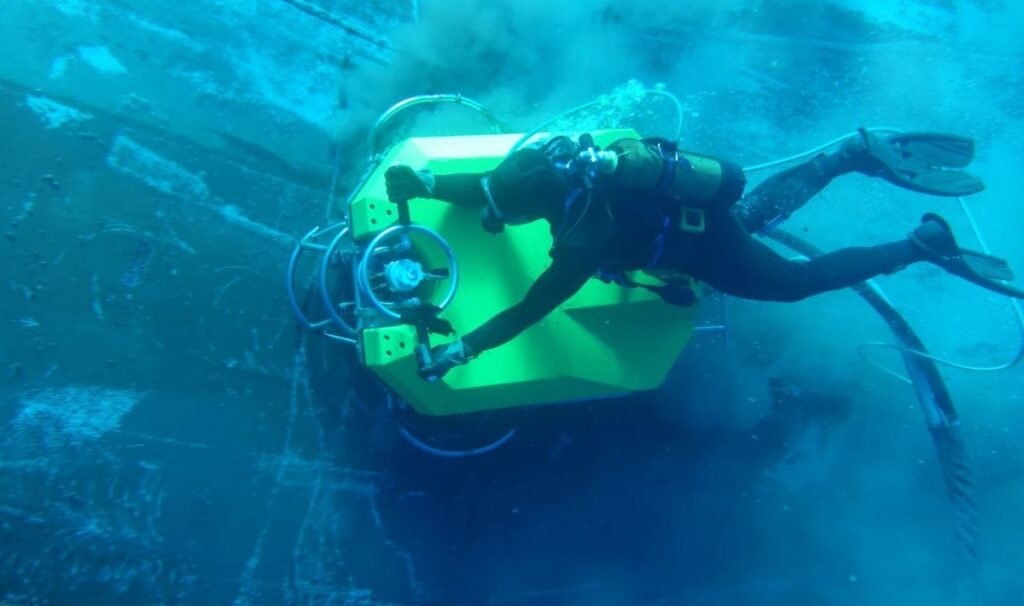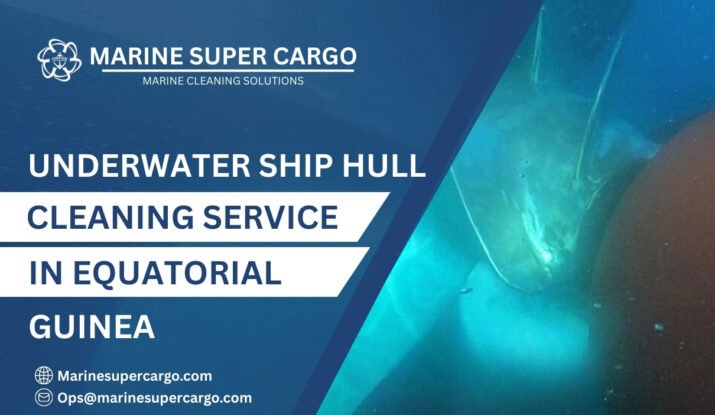Imagine your ship slicing through the warm tropical waters off the coast of Equatorial Guinea, sleek and swift. Beneath the surface, however, marine growth clings ferociously to your hull, threatening to slow you down, burn more fuel, and scale up maintenance costs. This is the reality for many vessels operating in this region and why underwater ship hull cleaning in Equatorial Guinea is an essential practice for efficient, sustainable, and cost-effective maritime operations.
Equatorial Guinea, with key ports like Malabo, Bata, and Luba, is a crucial gateway for shipping between Africa and global markets. These ports experience high vessel traffic in nutrient-rich tropical waters, which accelerates marine fouling. Ships calling on Equatorial Guinea must prioritize hull maintenance to maximize operational efficiency and comply with environmental regulations.
Why Underwater Ship Hull Cleaning in Equatorial Guinea is Essential
Impact of Biofouling on Fuel Consumption and Speed
Imagine running a marathon with weights strapped to your legs—the drag created by marine organisms like barnacles, algae, and mussels forces your vessel’s engines to work harder. This extra resistance can push fuel consumption up by as much as 40%, raising both operational costs and harmful emissions. Regular underwater hull cleaning minimizes drag, optimizes performance, and ensures compliance with environmental regulations such as the MARPOL Convention, which sets global standards for pollution prevention in shipping.

Environmental and Regulatory Importance for Underwater Ship Hull Cleaning in Equatorial Guinea
Biofouling isn’t just a maintenance issue—it poses a serious ecological risk by enabling invasive species to spread and disrupt local ecosystems. In Equatorial Guinea, maritime policies are aligned with international standards set by the IMO, ensuring ships adopt responsible cleaning practices and strict waste-capture measures. Providers follow best practices recommended by organizations such as the International Marine Contractors Association (IMCA), which promotes safe and sustainable marine operations. Compliance is both an ethical duty and a legal mandate, protecting biodiversity while avoiding fines and operational delays.
Marine Fouling Organisms Common in Equatorial Guinea’s Waters
Equatorial Guinea’s warm, tropical seas create ideal conditions for rapid fouling growth. Barnacles, green and brown algae, mussels, tubeworms, and calcareous sponges eagerly attach to submerged hulls, accelerating corrosion and roughening surfaces. This increases drag, raises fuel costs, and drives up maintenance demands for ship operators. Ports in the region, connected through global organizations like the International Association of Ports and Harbors (IAPH), emphasize best practices for managing biofouling sustainably. By adopting proper cleaning schedules, shipowners not only protect hull integrity but also ensure compliance with environmental standards, safeguarding both operational efficiency and marine biodiversity.
Technologies and Methods Employed for Underwater Ship Hull Cleaning in Equatorial Guinea
Diver-Based Manual Cleaning Techniques
Divers equipped with rotating brushes, scrapers, and suction tools remain a vital asset. Their expertise ensures gentle yet thorough cleaning, preserving specialized anti-fouling coatings essential for long-term protection.
Robotic and ROV Hull Cleaning Systems
Modern cleaning increasingly relies on remotely operated vehicles (ROVs) and robotic brush karts. These systems offer precision cleaning while enhancing diver safety and reducing cleaning times, especially on larger vessels.
Waste Capture and Environmentally Friendly Options
Leading service providers deploy closed-loop filtration and suction systems to capture all marine debris during cleaning, preventing environmental contamination and meeting regulatory mandates.
Step-by-Step Process of Underwater Ship Hull Cleaning in Equatorial Guinea
- Initial Inspection: Divers or ROVs survey and record biofouling levels to plan the cleaning strategy.
- Safety and Coordination: Preparations involve the vessel crew, port authorities, and cleaning operators, ensuring seamless and safe execution.
- Cleaning Operations: Manual or robotic removal of marine growth, focusing on delicate hull areas and propellers.
- Waste Management: Collected fouling is safely managed on-shore or via approved disposal processes.
- Final Inspection: Post-cleaning validations using video surveys ensure compliance and effectiveness.
Major Ports and Service Providers for Underwater Ship Hull Cleaning in Equatorial Guinea
The ports of Malabo, Bata, and Luba serve as key hubs for professional underwater ship hull cleaning in Equatorial Guinea. Services include diver-led and robotic cleaning, propeller polishing, and detailed underwater inspections. Many providers blend local expertise with international best practices to ensure efficiency and compliance for cargo ships, offshore supply vessels, and luxury yachts. Global specialists like CleanShip.co further enhance service availability, bringing advanced technologies and sustainable solutions to support shipowners in maintaining performance while protecting marine environments.
Choosing a Reliable Hull Cleaning Service Provider in Equatorial Guinea
Select providers with certified divers, advanced cleaning technology, transparent pricing, and strong environmental policies. Verified client reviews and adherence to port and IMO regulations are key markers of trustworthy partners.
Benefits of Regular Underwater Ship Hull Cleaning in Equatorial Guinea
- Reduced fuel costs and greenhouse gas emissions
- Smoother operating speeds and enhanced fuel economy
- Extended paint and hull integrity
- Environmental stewardship and compliance
- Prevention of costly repairs through early damage detection

Environmental Best Practices and Regulatory Compliance
Equatorial Guinea enforces strict environmental and safety standards for underwater ship hull cleaning, emphasizing waste capture, controlled disposal, and compliance with IMO regulations to safeguard marine biodiversity. Certified service providers follow robust protocols to minimize ecological impact, prevent the spread of invasive species, and ensure vessels operate within legal frameworks. By adhering to global standards such as the MARPOL Convention, shipowners protect both their assets and the marine environment, avoiding penalties while promoting sustainable shipping practices in Equatorial Guinea’s waters.
Conclusion:
Underwater ship hull cleaning in Equatorial Guinea is an investment in your vessel’s performance, operational costs, and environmental responsibility. With expert divers and state-of-the-art robotics, combined with strict adherence to regulations, you can ensure your ship sails fast, clean, and compliant through these tropical waters. Let’s keep your hull sleek as a dolphin and your voyages profitable and green.
FAQ:
Q1. How often should underwater ship hull cleaning be performed in Equatorial Guinea?
Typically, every 3–6 months; frequency depends on vessel activity and fouling levels.
Q2. Are robotic hull cleaning services available in Equatorial Guinea?
Yes, especially in major ports, offering safe and efficient cleaning options.
Q3. What types of marine growth are most concerning in Equatorial Guinea?
Barnacles, algae, mussels, tubeworms, and calcareous organisms have the greatest impact.
Q4. Can underwater ship hull cleaning be done while the ship remains at berth?
Yes, most cleaning operations happen in-water at port or anchor with minimal disruption.
Q5. What happens to the debris and waste after cleaning?
Certified providers capture and dispose of waste properly, preventing ocean contamination.


